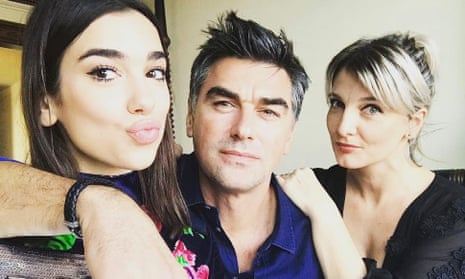Dukagjin Lipa had long wanted to organise a “proper festival” in his native Kosovo to put it on the cultural map and prove that Europe’s newest nation could be defined by more than conflict and scandal.
His task became much easier when his daughter, Dua Lipa, shot to global fame last year with her no 1 hit New Rules. Now, the 22-year-old will headline at a festival in Pristina this week, which the family hopes will boost Kosovo’s image abroad and its national pride at home. “We want to give people a sense of belonging, of European living and the idea that we are part of Europe,” Dukagjin Lipa told the Observer. “This is the greatest way to promote Kosovo as a peace-loving and music-loving country that welcomes all our neighbours and all visitors who want to have fun.”
Dua Lipa, who with Calvin Harris again reached no 1 in the UK singles chart earlier this year with One Kiss, is the eldest of three children born after Dukagjin left Kosovo with his wife in 1992 and settled in West Hampstead in London. The family speak English and Albanian at home, and Dua Lipa has frequently expressed pride in her Kosovo heritage, posting pictures of books written by her grandfather, who was head of Kosovo’s Institute of History, to her 15 million Instagram followers.
The Sunny Hill festival will not be the first time she has played in Kosovo. She met the mayor of Pristina and the president of Kosovo when she played there two years ago. “Coming back to my home town and getting to perform, it’s a pretty sick experience,” she said at the time.
Kosovo declared independence in 2008, nearly a decade after a Nato bombing campaign against the Serb-dominated Yugoslav state. Earlier this year, it celebrated 10 years since independence but the new nation still has major challenges on the road to full-fledged statehood: non-recognition by many countries, including China, India and five EU nations; high unemployment and poverty rates; what to do with a large Serbian minority that remains unintegrated; and persistent allegations against those close to government of endemic corruption and links to organised crime.
Kosovo’s relations with Serbia, which still claims the territory as its own, are fraught. Tensions are again high this weekend, which is the deadline for Pristina to offer a new framework for its Serb-majority areas. With more tough negotiations to come with Belgrade in the near future, the Lipa family hopes that, for a while at least, the festival will change the news agenda around Kosovo.A large-scale music festival has never been staged in Kosovo until now. Tickets for Sunny Hill are priced at €55 for all three days, a bargain by European festival standards and designed to be affordable for young music fans in Kosovo.
Though Kosovo has a population of under 2 million, it has proved fertile ground for musical talent, with the Kosovo-born British singer Rita Ora also achieving fame, and Era Istrefi singing alongside Will Smith at last month’s World Cup final. Dukagjin Lipa trained as a dentist but was also a singer with a band called Oda, which will reunite to play at the festival.
Memli Krasniqi, Kosovo’s former culture minister, said: “In the 1990s and early 2000s it was difficult for anyone to break through. Rita Ora and Dua Lipa made it in the UK but it makes us proud that they are helping to put Kosovo on the map.”
With the musical success of the pair, as well as the flair of footballers of Kosovan origin such as Granit Xhaka and Xherdan Shaqiri during the World Cup, international perception of the country is starting to change.
“When we became independent in 2008 there was an urge to tell people that this is a real country that really exists and not just the images you have of a war-torn place,” said Kreshnik Hoxha, who was born in Kosovo in 1987 but moved to Britain to do his A-levels, degree and PhD, and currently works in pharmaceutical research in Oxford. “I do think that, now, the image is changing slowly. It’s very encouraging when you see Rita Ora or Dua Lipa who are very well integrated in the UK but embrace both nationalities.”
Dukagjin Lipa agreed that, slowly, the image of Kosovo in Britain is changing for the better, having gone through several iterations since he first moved in 1992: “When we first came to London you would tell people you were from Kosovo and nobody knew where it was. Then, later, everyone would say, ‘Oh, I’m so sorry’. It was good that people had empathy but I don’t want to be pitied. Then, with all the turmoil we had, parts of the problematic sector of our society migrated, and when you said you’re from Kosovo, people thought about drug dealers or criminals. We want to show a very different image.”











